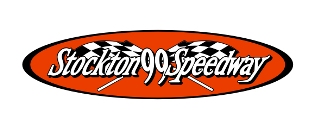
Stockton 99 Speedway 1946
(before completion)
Billy Vukovich at Stockton 99 Speedway in 1947.

Stockton 99 Speedway, Early Race. Note the goal posts in the infield,
St. Mary's High School played football there!!
LORI GILBERT
Record Staff Writer
Published Sunday, Sep 17, 2006
Above the roar of the engines that
emanated from Stockton 99 Speedway's oval one final time on a beautiful
Saturday night rose a groundswell of emotion.
From longtime drivers reminiscing about their white knuckle days behind
the wheel to fans young and old savoring the finale of the 60-year run,
Saturday night was bittersweet.
None could have felt that more than the members of the Hunefeld family.
If the end of racing at the speedway meant no more Saturday nights of
fumes, fights and frantic finishes, for the Hunefelds it meant the end
of a legacy, the closing of the family business.
|
|
"I'm happy; I'm sad," Chris Hunefeld said. "I'm putting off thinking
about it. It hasn't hit me yet. It will probably be awhile before it
does."
Let's hope so, for his sake.
Giving up the raceway is like giving up a piece of family lore.
Bill Hunefeld, Chris's grandfather, bought the property on Wilson Way
and opened the track in 1947. He was a man with a vision, along with an
uncanny sense of timing and promotion.
Hunefeld had promoted boxing in the 1930s when the sport was at its
popularity peak. He promoted wrestling in the 1940s and 50s when it
enjoyed a great following.
He'd put on midget-car races at old Baxter Stadium in 1940 and 1941, and
jumped into the car racing game when it regained its footing after
having been stopped by the lack of rubber and gasoline during the war
years.
His son, Bob, returned from his stint in the Navy in time to watch the
end of that 1947 debut season, and in 1948 his dad told him he wanted
him to run the concessions.
"I didn't want to do that, but he said he'd give me $25 a show, so I
said OK," Bob Hunefeld said.
His future wife worked in that concession stand, earning enough money to
buy his wedding ring.
His memories of working at the track may not be as precious as that, but
he's been part of the operation ever since.
"It's very emotional," Bob Hunefeld said. "I have mixed emotions about
it. My son (Chris) has been handling it for so many years, there's not
much work for me.
"Chris will really miss it. He's into the racing. I'm more into hot dogs
and beer."
No question, Chris is the racing fan of the family.
"I wanted to come out and watch the races. I used to beg him to bring me
with him when he came to work," Chris Hunefeld said.
A trip to the track became an annual postseason trip for his Little
League baseball teams, beginning when he was 8.
Other times, he just sat in the stands and watched by himself as his dad
sold hot dogs, beer and popcorn.
"One time (Bob) sat me down next to
someone I didn't know who looked kind of rough," Chris said. "He said
he'd watch out for me. I was eating a hot dog and it fell on the ground,
in the peanut shells. I remember this guy pulled out a pocket knife,
which surprised me a little, and he cut off the part that fell on the
ground and I ate the rest of the hot dog."
Chris graduated to selling those peanuts whose shells collected under
the bleachers.
At age 12, he had a Social Security card and earned 15 percent from
every 100-bag carton of peanuts he sold for 15 cents a bag.
He spent those profits on model cars that he'd put together.
Chris left the speedway business after graduating from University of the
Pacific to pursue a musical career. After nine years on the road playing
guitar for various bands, he returned to the family fold, taking over
concession sales at the speedway in 1984.
Although weekends at the track became a job for him, as it was for his
dad, Chris never lost his love for the sport.
He even got in a car and drove practice laps one time.
"Talk about a rush," Chris said. "It's totally different from the
go-karts you drive at an amusement park. That's fun. This was like
driving on ice. The cars don't react like passenger cars. The way you
use the gas and brake can make you spin out. You have to hit the exact
right spot, and if you do, you don't have to turn the wheel or use your
break."
The experience that had him gagging on dust after spinning out in the
infield was enough for him.
He contented himself with the more profitable speedway ventures of
selling concessions, billboard signs and programs, and operating the
track's Web site.
They're various jobs he's done - some for 20 years - and the thought of
no longer tending to them was too much to comprehend on the final night.
He planned to spend today recovering from having served the biggest
crowd in recent memory. Come April, when another season of racing would
normally start, he said he'll be found watching a Giants game at AT&T
Park, where he marvels at concession prices.
Gouging the public was never his style. Carrying on a tradition,
providing family entertainment in the fashion first envisioned by his
grandfather was his mantra.
To that end, it was a true Hunefeld event, right down to Chris'
children, 12-year-old Allie and 9-year-old Billy making the final,
"Gentlemen, start your engines," call.
It was a poignant, sweet ending - one that brought the track full
circle.
Their great grandfather, Bill, had uttered the same words, at the same
track, 60 years earlier.
Contact columnist Lori Gilbert at (209) 546-8284 or lgilbert@recordnet.com
